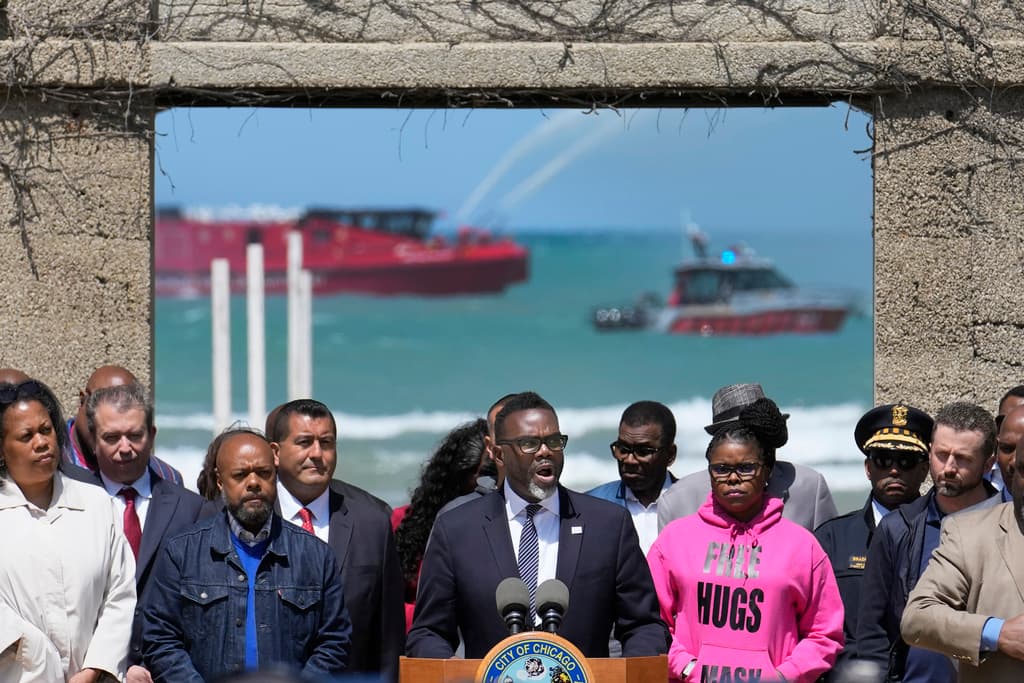Chicago, a ‘Sanctuary City,’ Reaches Its Breaking Point
‘We do not want a sanctuary city, we do not want a sanctuary state,’ a resident said Thursday, as Chicago council members push to allow voters to reconsider the city’s sanctuary status.

The future of Chicago’s designation as a sanctuary city hangs in the balance as residents grow increasingly frustrated over the nearly 12,000 migrants crowding the city’s shelters and thousands more who are unsheltered.
Several of the city’s council members are pushing for a ballot initiative to allow voters to decide in the March election if Chicago should remain a sanctuary city. Thursday’s council meeting sparked heated debate about the federal government’s role in addressing the crisis and escalating racial tensions at the Windy City.
In a preview of how voters could feel, the public comments at the meeting had a common theme: Residents said Chicago needs to deal with the crime it already is suffering rather than trying to be a place of refuge for thousands of immigrants.
“I’m here to describe the imagery of a Chicagoian life,” one resident said during the public comment period of Thursday’s city meeting. “When I was 11, I was exposed to children using drugs and alcohol, at 13, I had a gun to my head. On the night of my 18th birthday, I was jumped by three women and one man, I had 30-something hits to my head, and I was unrecognizable.”
She added that she did not expect her neighborhood to be in a discussion about “developing a tent facility for 3,500 migrants from another country” when the city needs to be helping “the people that are already here.”
“We do not want a sanctuary city, we do not want a sanctuary state,” she said.
Other residents said they were angry that Black leadership in the city was “doing nothing” as Hispanic and Latino migrants take away jobs and resources from Black residents. “It’s starting to become a race war,” one Black resident said. “The United States is looking at us.”
The city council’s Thursday meeting is taking place at the same time as a coalition of big-city Democratic mayors who wrote a letter to President Biden are at Washington, D.C., pleading for federal help dealing with the migrant crisis. Chicago’s mayor, Brandon Johnson, is among them was asking the president for $5 billion in funding on Thursday.
“We’re burdening the people of Chicago in a way that has become quite heavy,” Mr. Johnson, who was not reachable by the Sun for comment, said of the migrant influx ahead of his D.C. trip.
“We’re gonna push the federal government, just like we’re gonna push the state of Illinois to do its part. Look, Chicago is leaning in. We have borne the brunt of the responsibility,” Mr. Johnson said. “That’s not an equitable distribution to how government should cooperate.”
Chicago became a sanctuary city in 1985 through an executive order by its mayor at the time, Harold Washington. In 2012, Mayor Rahm Emanuel passed a “welcoming city” ordinance that protected illegal immigrants by making it prohibitive for the city to share their information with the federal government.
Chicago city council members said Thursday that “times were different” when the 1985 executive order was passed, and that voters deserve a say about whether the city should remain a sanctuary.
“I guarantee you that if Harold Washington was here today, what he signed into law as an executive order is not what he intended for today,” one alderman said, adding that cities all over America are shipping migrants to Chicago.
“We have to draw the line somewhere,” he added. “It’s a diversion to continue to say ‘this is a federal problem, we need help from the federal government.’ Yeah we know that. But while we’re waiting for the federal government to act, we need to be doing something here at home to protect us.”
If Chicago voters are given the chance on the ballot to change the city’s status, it will be eight years after The New York Sun called for Chicago to “abandon this business about being a so-called ‘sanctuary city.’”
“The sanctuary city movement puts these municipalities at odds with the federal government on immigration law enforcement,” the Sun’s editors wrote in 2016, because the Constitution is the “supreme law of the land” and binds public officers. Even the Obama administration recognized sanctuary cities as a defiance of federal immigration law, the Sun noted at the time.

